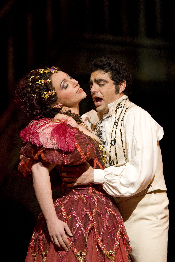
28 Nov 2008
The Tales of Hoffmann at Covent Garden
The opening performance of the ROH’s seventh revival of John Schlesinger’s 1980 production of The Tales of Hoffmann was dedicated to the memory of Richard Hickox.
English Touring Opera are delighted to announce a season of lyric monodramas to tour nationally from October to December. The season features music for solo singer and piano by Argento, Britten, Tippett and Shostakovich with a bold and inventive approach to making opera during social distancing.
This tenth of ten Live from London concerts was in fact a recorded live performance from California. It was no less enjoyable for that, and it was also uplifting to learn that this wasn’t in fact the ‘last’ LfL event that we will be able to enjoy, courtesy of VOCES8 and their fellow vocal ensembles (more below …).
Ever since Wigmore Hall announced their superb series of autumn concerts, all streamed live and available free of charge, I’d been looking forward to this song recital by Ian Bostridge and Imogen Cooper.
The Sixteen continues its exploration of Henry Purcell’s Welcome Songs for Charles II. As with Robert King’s pioneering Purcell series begun over thirty years ago for Hyperion, Harry Christophers is recording two Welcome Songs per disc.
Although Stile Antico’s programme article for their Live from London recital introduced their selection from the many treasures of the English Renaissance in the context of the theological debates and upheavals of the Tudor and Elizabethan years, their performance was more evocative of private chamber music than of public liturgy.
In February this year, Albanian soprano Ermonela Jaho made a highly lauded debut recital at Wigmore Hall - a concert which both celebrated Opera Rara’s 50th anniversary and honoured the career of the Italian soprano Rosina Storchio (1872-1945), the star of verismo who created the title roles in Leoncavallo’s La bohème and Zazà, Mascagni’s Lodoletta and Puccini’s Madama Butterfly.
Evidently, face masks don’t stifle appreciative “Bravo!”s. And, reducing audience numbers doesn’t lower the volume of such acclamations. For, the audience at Wigmore Hall gave soprano Elizabeth Llewellyn and pianist Simon Lepper a greatly deserved warm reception and hearty response following this lunchtime recital of late-Romantic song.
Collapsology. Or, perhaps we should use the French word ‘Collapsologie’ because this is a transdisciplinary idea pretty much advocated by a series of French theorists - and apparently, mostly French theorists. It in essence focuses on the imminent collapse of modern society and all its layers - a series of escalating crises on a global scale: environmental, economic, geopolitical, governmental; the list is extensive.
For this week’s Live from London vocal recital we moved from the home of VOCES8, St Anne and St Agnes in the City of London, to Kings Place, where The Sixteen - who have been associate artists at the venue for some time - presented a programme of music and words bound together by the theme of ‘reflection’.
'Such is your divine Disposation that both you excellently understand, and royally entertaine the Exercise of Musicke.’
Amongst an avalanche of new Mahler recordings appearing at the moment (Das Lied von der Erde seems to be the most favoured, with three) this 1991 Mahler Second from the 2nd Kassel MahlerFest is one of the more interesting releases.
‘And there was war in heaven: Michael and his angels fought against the dragon; and the dragon fought and his angels, And prevailed not; neither was their place found any more in heaven … that old serpent … Satan, which deceiveth the whole world: he was cast out into the earth, and his angels were cast out with him.’
If there is one myth, it seems believed by some people today, that probably needs shattering it is that post-war recordings or performances of Wagner operas were always of exceptional quality. This 1949 Hamburg Tristan und Isolde is one of those recordings - though quite who is to blame for its many problems takes quite some unearthing.
There was never any doubt that the fifth of the twelve Met Stars Live in Concert broadcasts was going to be a palpably intense and vivid event, as well as a musically stunning and theatrically enervating experience.
‘Love’ was the theme for this Live from London performance by Apollo5. Given the complexity and diversity of that human emotion, and Apollo5’s reputation for versatility and diverse repertoire, ranging from Renaissance choral music to jazz, from contemporary classical works to popular song, it was no surprise that their programme spanned 500 years and several musical styles.
The Academy of St Martin in the Fields have titled their autumn series of eight concerts - which are taking place at 5pm and 7.30pm on two Saturdays each month at their home venue in Trafalgar Square, and being filmed for streaming the following Thursday - ‘re:connect’.
The London Symphony Orchestra opened their Autumn 2020 season with a homage to Oliver Knussen, who died at the age of 66 in July 2018. The programme traced a national musical lineage through the twentieth century, from Britten to Knussen, on to Mark-Anthony Turnage, and entwining the LSO and Rattle too.
With the Live from London digital vocal festival entering the second half of the series, the festival’s host, VOCES8, returned to their home at St Annes and St Agnes in the City of London to present a sequence of ‘Choral Dances’ - vocal music inspired by dance, embracing diverse genres from the Renaissance madrigal to swing jazz.
Just a few unison string wriggles from the opening of Mozart’s overture to Le nozze di Figaro are enough to make any opera-lover perch on the edge of their seat, in excited anticipation of the drama in music to come, so there could be no other curtain-raiser for this Gala Concert at the Royal Opera House, the latest instalment from ‘their House’ to ‘our houses’.
"Before the ending of the day, creator of all things, we pray that, with your accustomed mercy, you may watch over us."

The opening performance of the ROH’s seventh revival of John Schlesinger’s 1980 production of The Tales of Hoffmann was dedicated to the memory of Richard Hickox.
Hickox, who died suddenly on Sunday, had conducted the 2004 revival of this opera, the production in which Rolando Villazón created a sensation in the title role and instantly became a household name.
Returning to the role, one which is a gift to such a versatile and committed character player, Villazón seemed older and wiser: more mature in his interpretation, instantly establishing his presence with the inebriate bluster of the Prologue’s Kleinzach song but equally comfortable with the nostalgic reveries of the Epilogue; and more astute in his pacing, somewhat restrained at the start but sensibly conserving his voice, relaxing and releasing a tone of warmth and ardour in the final scenes.
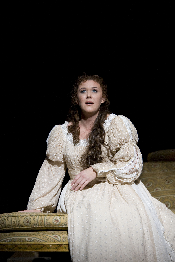 Katie Van Kooten as Antonia
Katie Van Kooten as Antonia
The production itself cannot be said to have made the same graceful
passage to maturity. The revival director, Christopher Cowell, has retained
the original Personenregie, with scarcely a fresh gesture. And, the
old sets looked tired and fussy, even tawdrily camp: sumptuously extravagant
and evocative of the opera’s various locations they may be, but the
accumulation of superfluous detail results in a rather dated literalism
— the ‘real’ gondola, the giant ‘floating’ bed
and miles of vermillion velvet hammer home their points but leave little room
for subtlety or imaginative nuance. Hoffmann’s original short stories
combine artistry and grotesquery, sparkling glitter and dark, ponderous
depths; yet this production seldom scratches beneath the surface, frequently
lapsing into gratuitous, pantomimic clichés.
This was a solid rather than a stunning cast. Of the female roles, Ekaterina Lekhina as Olympia was the audience favourite although this listener found her rather underwhelming; but she was jerkily, jitteringly suggestive of a soulless automaton, and certainly conquered the vocal peaks with confidence and accuracy of intonation, although there was little sense of continuity of line as she scaled the precipices. Katie van Kooten was an impressive Antonia, her radiant upper range strong and clear, although underneath the intonation was sometimes suspect and marred by unfocused note production. Christine Rice’s Guilietta was an intelligent, dramatically convincing performance, the powerful lower register of her resonant dark mezzo delightfully sensuous, perfectly conveying the courtesan’s allure. However, at times she overpowered Villazón in their duet textures, for while his high-lying lines were delivered with cleanness and panache, he was more subdued in the lower registers. Moreover, the erotic intertwining of the intended soprano and mezzo timbres in Guilietta’s duet with Niklausse, another mezzo, were diminished. Indeed, despite Rice’s intelligent portrayal, the Venetian act was the least successful; the assorted writhing couples languorously scattered about the opulent milieu evoked little genuine sensuality, and the whole lacked dramatic tension.
In the dual role of Niklausse/Muse, Kristine Jepson’s bright, animated tone projected well. Jepson has much stage confidence and natural ease; and she established an engaging relationship with Villazón which would have benefited from more sensitive and encouraging direction.
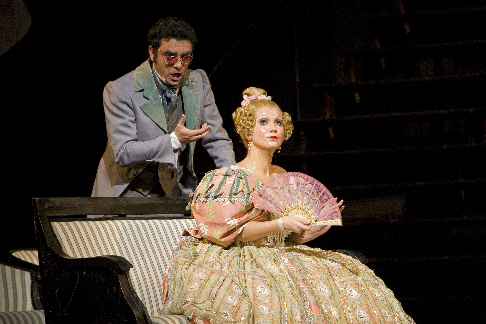 Rolando Villazón as Hoffmann and Ekaterina Lekhina as Olympia
Rolando Villazón as Hoffmann and Ekaterina Lekhina as Olympia
Gidon Saks was a pantomime villain and rather underpowered nemesis. While his Act 2 Dr Miracle oozed menace and malevolence, both characterisation and projection weakened in the later stages of the opera. The veteran character tenor, Graham Clark, had tremendous fun in his multiple roles as the four servants, raising many a laugh; but his grotesque shrieks and exaggerated affectations destroyed the poignancy of Hoffmann’s demise.
The minor roles were uniformly compelling: Matthew Rose was Crespel, Robin Leggate, Spalanzani, and Gaynor Keeble, the spirit of Stella’s mother. Kostas Smoriginas was a commanding Schlemil.
Antonio Pappano led the orchestra of the ROH on a competent, but rather pedestrian passage through the score, with little feeling for the delicate touch and deft subtleties of French frivolity. The orchestral playing was often heavy and sluggish, and even the renowned Barcarolle lacked shimmer and transparency. Overall, Pappano created little energy and forward momentum; and occasionally the pit-stage ensemble was insecure, particularly in the choruses.
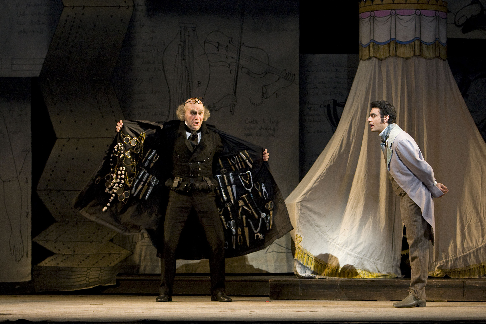 Rolando Villazón as Hoffmann and Gidon Saks as Coppélius
Rolando Villazón as Hoffmann and Gidon Saks as Coppélius
So, this was Rolando Villazón’s evening. There have been endless musicological speculations about missing, eliminated, reconstructed and re-positioned material. Here the Venetian Act was placed second, making nonsense of Hoffmann’s progression from hope of first material, then unworldly, fulfilment to disillusionment and despair. Thus, this production relied on its Hoffmann to unite the self-contained acts and to provide continuity and credibility. While some might complain that Villazón’s acting was at times overly frenetic and hyperactive, there is no doubt that his commitment to the role is absolute: and he conveyed Hoffmann's descent from youthful naïf to alcoholic cynic with total conviction. If Villazón took a little while to warm up vocally, this is understandable given the stamina required for such sustained musical and dramatic commitment. And, in the concluding moments, the slightly guarded tone of the earlier acts blossomed into a radiating timbre of myriad colours. Just what the audience had been waiting for.
Claire Seymour
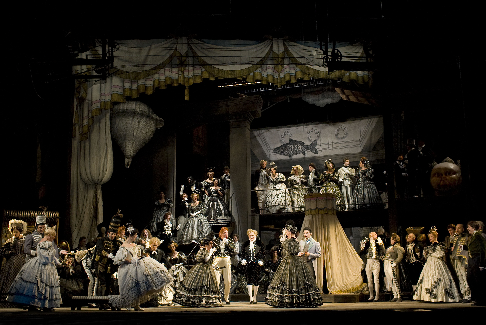 A scene from The Tales of Hoffmann
A scene from The Tales of Hoffmann